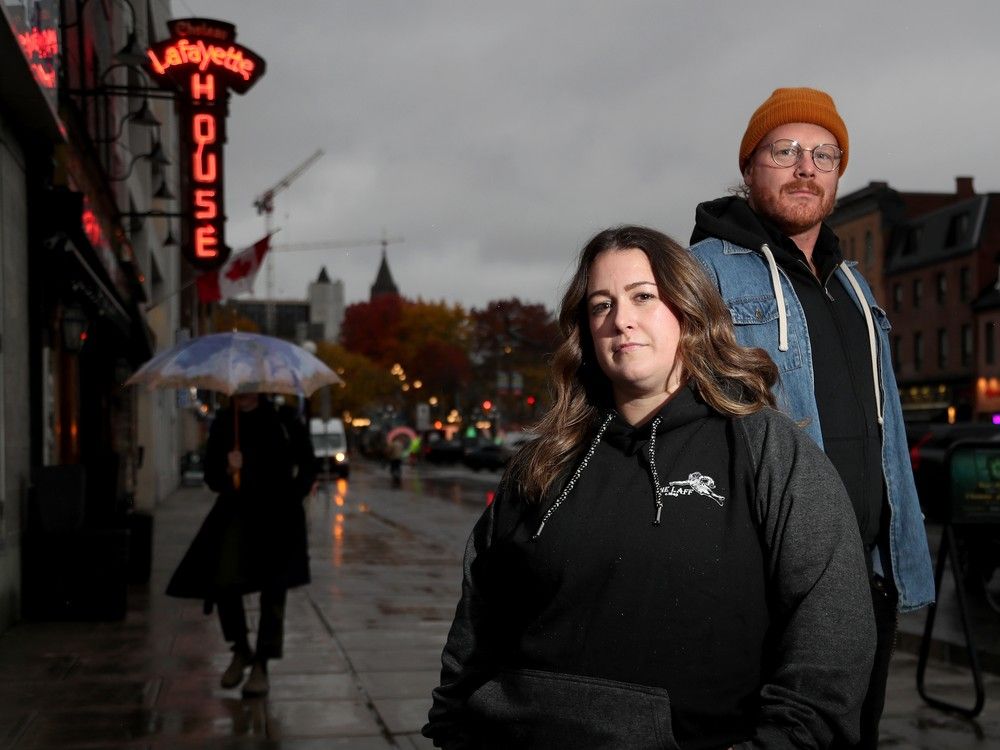Ottawa musician Shawn Tavenier has collected several parking tickets this year while trying to make a living as a guitar-playing singer-songwriter.
It stings every time, especially when the fine eats most of his wage, but the one that felt most unfair happened in
the ByWard Market
during the Easter weekend last spring.
Tavenier had performed at the
Chateau Lafayette
, and returned the next day to pick up the rest of his gear. He stopped his car in front of the York Street tavern, activated the hazard lights and popped into the bar to grab the city-issued parking permit designed to allow musicians time to load in or out of venues.
The musicians’ and artists’ loading permit
was created in 2018 in response to a litany of complaints from musicians who had been ticketed. To acquire the permit, it’s up to the venue owner to apply online, pay a $50 fee and then loan the paper pass out to musicians.
According to the city website: “Each permit card will allow drivers to temporarily park on-street in a “Loading Zone” or signed “No Parking Zone” with the ability to leave vehicles displaying the musician and artist loading permit unattended and/or inactive for up to 15 minutes at a time, in addition to the time spent actively loading/un-loading the vehicle.”
Tavenier was gone for less than two minutes. But by the time he got back with the permit,
a parking-control officer
was writing him a ticket.
Tavenier reasoned with him, but the official did not recognize the permit.
“The ticket that he gave me was basically for my whole paycheck the day before,” Tavenier said. “It was ruthless.”
He’s not the only person who resents the over-zealous parking enforcement in the ByWard Market, and wonders if parking-control officers are expected to meet a certain quota each month.
From Cumberland to Carp, the general perception is that
parking is a nightmare in the Market area
, and the city’s parking-control officers are merciless in their haste to issue tickets. The fines are not cheap, either, adding an extra $40-$130 or more to your excursion, depending on the infraction.
The ByWard Market District Authority (BMDA) says there are
more than 3,100 parking spaces available in the Market and another 8,000 spots in the surrounding area. But competition is fierce and parking control is tireless.
“The volume of activity here means enforcement is naturally more visible,” explained Victoria Williston, the BMDA’s communications manager, in an email.
She said the BMDA hears about it when vendors or businesses get ticketed, and works with them and the city’s public-realm office to find “practical solutions.” As a result, she said 12 new loading zones were created to serve as pick-up and drop-off spots for visitors, and reduce ticketing pressure.
Despite the initiative, parking in the Market is still a challenge, and enforcement is as vigilant as ever. The often confusing signs don’t help, says
Dominique ‘Deek’ Labelle, manager and co-owner of the Laff.
“They are ruthless when it comes to ticketing,” said the proprietor of the city’s oldest bar, a popular watering hole in a high-traffic area of the Market. It features local musicians every night.
With cases like Tavenier’s, Labelle said the ticket likely stemmed from the relocation of the Laff loading zone, formerly in front of the main entrance. It had been shifted a couple of car lengths down the street, but marked by a sign that faced the opposite direction. Drivers would miss the sign and stop in front of the main entrance, a strictly enforced no-stopping zone.
“In a no-stopping zone, they can ticket you without even telling you, even if you’re sitting in your car,” Labelle said. “No stopping is no stopping.”
Enforcement is based on what the sign says, but too often the signs are unclear or missing key information, she noted.
“They will ticket you even though you’ve paid because you didn’t understand what their signage meant,” Labelle said.
She gave the example of the parking meters on York Street that failed to mention parking is limited to two hours, even on Sundays. People didn’t realize there was a limit, and thought they could leave their cars for the whole afternoon. Instead, they were ticketed.
Also puzzling was the parking situation along William Street. After the summer pedestrianization of the street, which temporarily removed the parking spots to make way for Market vendors, business owners expected the spaces to be reinstated for the winter.
Instead, signs went up reserving the spaces for vendors. If a customer parked there, they got a ticket.
“Unless you have a PhD in City-of-Ottawa-speak, you’re just flailing and trying to interpret it,” said Labelle, “and then bylaw is out there ticketing the living crap out of every single tourist and resident that comes down to ByWard.”
Labelle has become an expert on Ottawa’s parking zones, and is persistent in her efforts to convince municipal officials to clarify the restrictions.
“I don’t get parking tickets anymore because I have spent years trying to understand what the rules are,” she said. “My personal vendetta against the city now is trying to educate the rest of the world on what those rules are so they can stop trapping people into parking tickets.”
For their part, city staff deny the notion that parking-control officers have a quota.
Nor do they target the ByWard Market area, although they are “proactive,” explained
Roger Chapman, the city’s director of by-law and regulatory services.
“By-law and Regulatory Services (BLRS) enforces parking regulations across the City of Ottawa,” he said in an email. “In high-density areas such as the ByWard Market, BLRS officers proactively patrol for violations including parking near fire hydrants, pay-and-display infractions, and no parking or no stopping zones.”
As for the signage on William, it “currently serves customers,” said Heidi Cousineau, manager of traffic, safety and mobility, but “
may be
modified by the Byward Market District Authority for vending purposes.”
Cousineau also said that the loading zone in front of the Laff shifts each year to “accommodate the business’s
patio footprint” in the summer. It’s scheduled to be reinstated in front of the Laff, its usual winter-spring location, in the coming days, she added.
Labelle was delighted to hear she would get her loading zone back, and was told the parking metres were to be updated, too. “Big wins!” she texted.

A few doors down on York Street, Mandy Gosewich is the owner of Stunning! fashion accessories, a one-woman boutique located across from the Ottawa letters.
The most heartless example of ticketing she witnessed outside her shop occurred when a mother was transferring children from their stroller into the back seat. At the same time, a parking officer was at the front of the vehicle, writing up a ticket.
“I totally get it that we all have to do our jobs, and there are things in our jobs that sometimes we have to do and not everyone’s going to agree with,” Gosewich said. “But seriously, do you not have any compassion watching a mom getting into a car with her kids?”
Gosewich has had her share of parking tickets, including one for being in the loading zone in front of her store, when she was unloading merchandise. She said she didn’t bother fighting the ticket because it would have meant closing the store for a day to appear in court.
But the fourth-generation ByWard Market retailer wants to think of the big picture, too. She’s looking forward to the day when York Street becomes a pedestrian plaza, as outlined in
the ByWard Market Public Realm plan.
Shoppers won’t have to worry about parking tickets because cars won’t be allowed.
“People will be on their bikes and people will be walking and becoming more urban dwellers, and that will become a way of life,” Gosewich predicted.
In the end, Tavenier accepted his role in parking improperly and paid the fine, but said it still feels like the city is out to get people who dare to drive to the Market.
“Every time you get a parking ticket, it’s your own fault,” he said. “There’s no way around it. They can’t give you a ticket unless you broke a regulation. But those regulations keep changing. It feels like they’re moving the goalposts all the time.”
“It feels like they hate us,” he added. “They want Ottawa to be considered a world-class entertainment city and a world-class food-and-drink city, and yet they’re preying on professionals and tourists. I think that it needs to be addressed.”
Related
- New ByWard Market restaurants laud location — despite neighbourhood’s reputation
- Deachman: The ByWard Market is both beautiful and broken
Our website is your destination for up-to-the-minute news, so make sure to bookmark our homepage and sign up for our newsletters so we can keep you informed.



